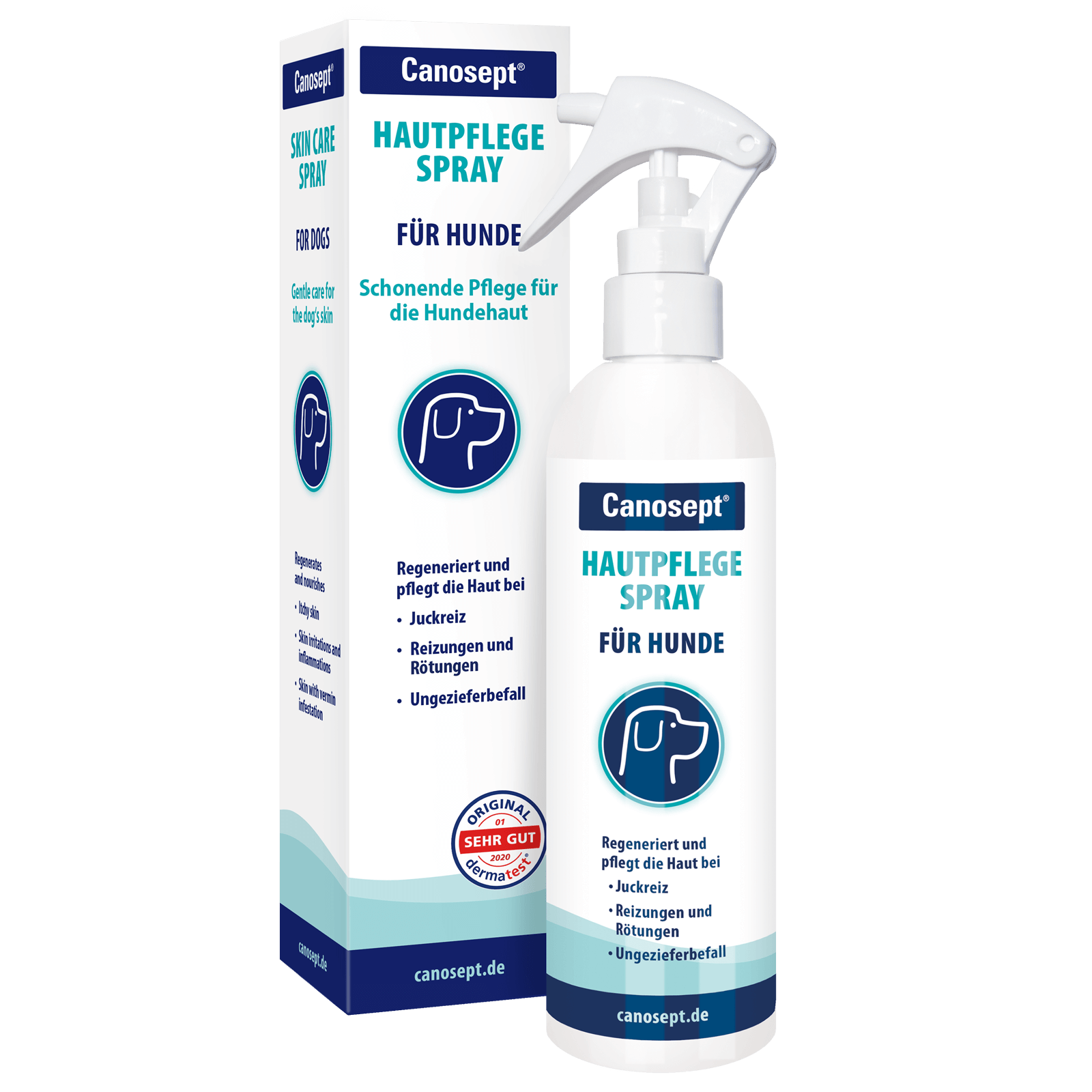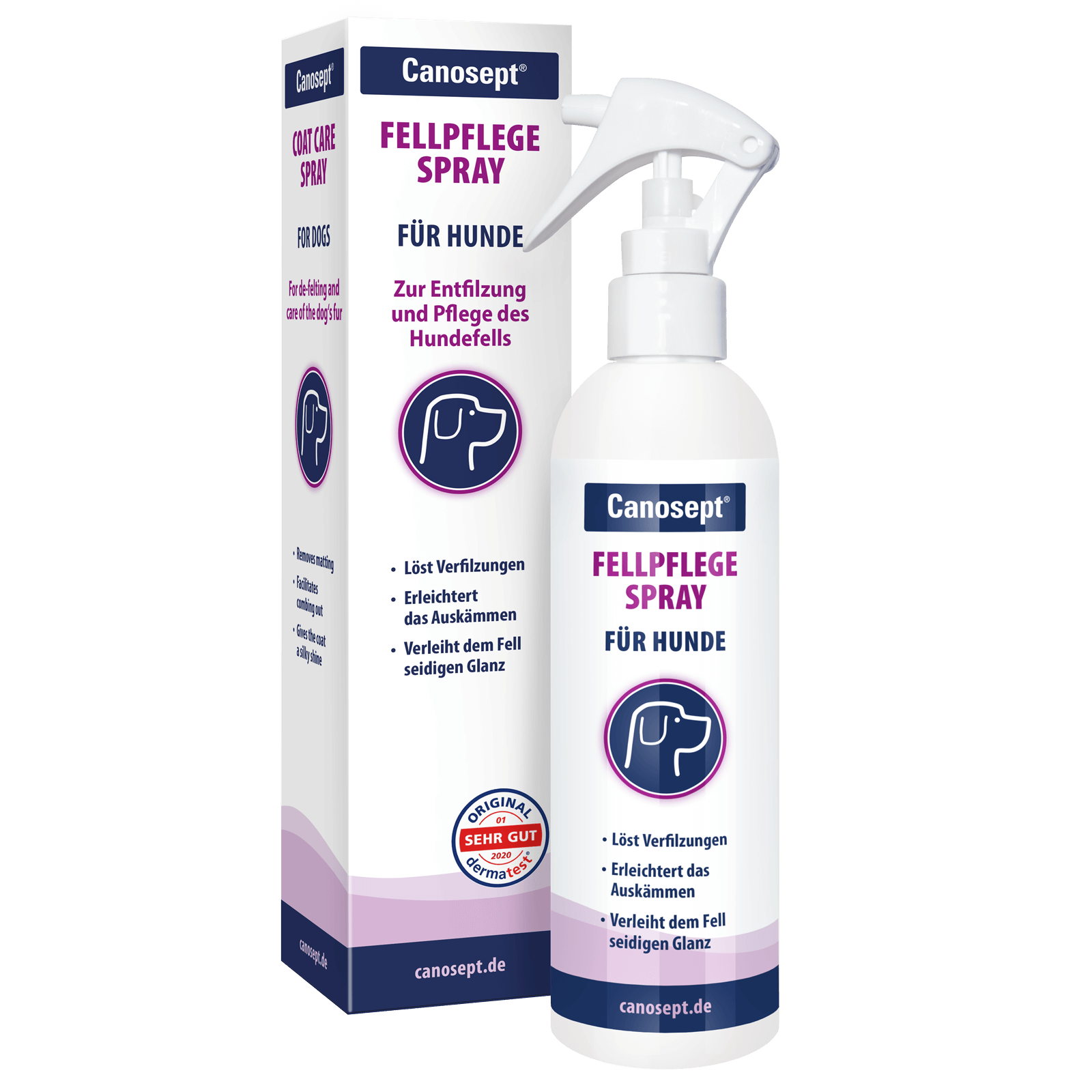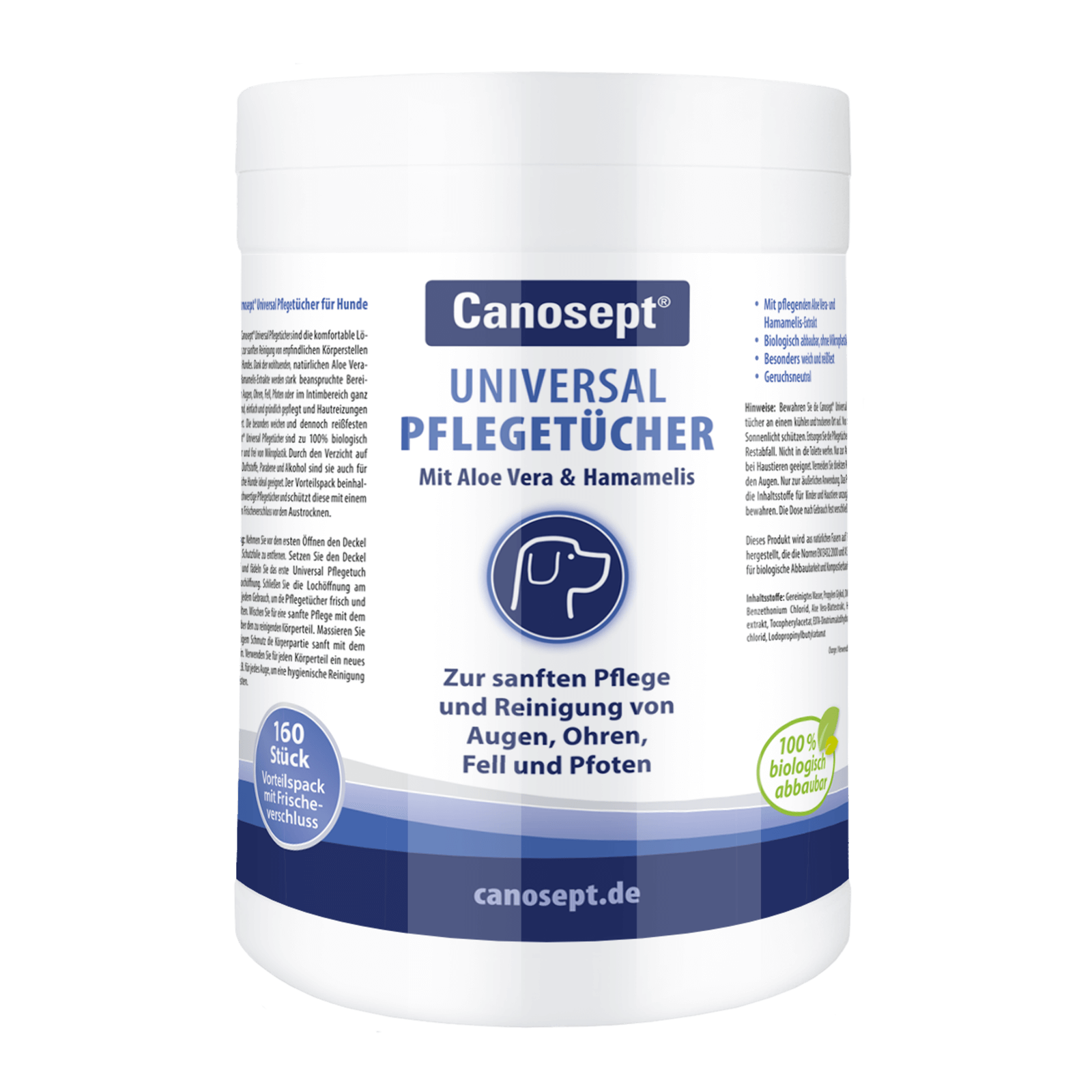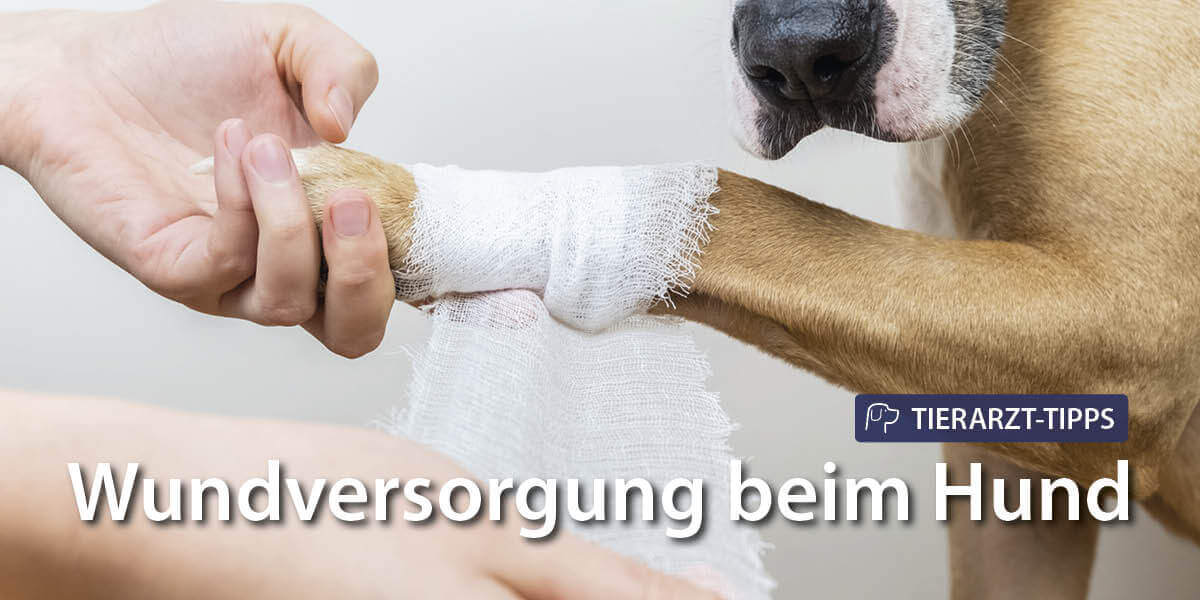- My dog keeps scratching – 6 skin care tips
- My dog keeps scratching - How do I treat itching in my dog?
- My dog constantly scratches - causes
- Preparing for a vet visit
My dog keeps scratching – 6 skin care tips
Itching is just as annoying for dogs as it is for humans. Regular skin care for your dog will help reduce the annoying itching. These 6 tips will help you with dog skin care.
The checklist at the end of the blog post is particularly helpful in working with your veterinarian to determine the possible cause of the itching.
Dog skin care – Tip 1: Cuddle!
Our absolute favorite tip for dog skin care: cuddling! Stroking encourages the distribution of natural oils on the skin. This keeps the dog's skin moist and simultaneously promotes bonding with your dog.
To remove dead skin cells and loose hair and promote blood circulation, you should brush your dog regularly. Brushing also promotes the development of new, healthy skin. Here you'll find all the tips for perfect dog grooming .
Dog skin care – Tip 2: Care for regeneration
There are many reasons why a dog's skin can itch. Common causes include inflammation, irritation, dryness, or an infestation. Canosept Skin Care Spray is a mild care lotion made from purely natural and well-tolerated active ingredients, such as whey protein and ash extracts. Regular use nourishes the skin and promotes the regeneration process in cases of itching, inflammation, and irritation, bald patches, yeast infections, and during and after infestations with ticks, fleas, and mites. It supports the healing of dry and chapped skin. Organic, nourishing, and pH-neutral. Learn more about Canosept Skin Care Spray now.

Dog Skin Care – Tip 3: Shampoo Rarely
When it comes to shampooing your dog, your rule should be: as often as necessary, as infrequently as possible. First, try brushing the dirt out of the coat or showering with cool water only. Cool water is generally perceived as soothing and can further reduce itching, especially in cases of environmental allergies.
If a bath is unavoidable, special dog shampoos are the perfect solution to successfully prevent further drying of the dog's skin. In addition to a special dog shampoo, we recommend our pH-neutral Canosept skin care spray . Natural whey and ash extracts nourish and regenerate the dog's skin after the bath.
Dog skin care – Tip 4: Let wet fur dry thoroughly
Whether after a bath, a rainy walk, or a swim in the lake, dry your dog's coat thoroughly with a bath towel. Special microfiber dog bathrobes are also helpful for drying the skin and coat faster and conveniently keep your home clean.
Wet fur should be allowed to dry thoroughly to avoid warm, moist patches on the skin, which provide an ideal breeding ground for bacteria and parasites. Pay particular attention to the ears, belly, groin and elbow areas, and paws.

Dog skin care – Tip 5: The right food
Poor nutrition is often a cause of health problems in dogs. High-quality food not only improves skin and coat, but also overall health. High-quality food contains all the nutrients your dog needs.
The necessary nutrients include essential omega-3 and omega-6 fatty acids for healthy skin. For example, adding a tablespoon (depending on the dog's size) of salmon oil or cold-pressed vegetable oil such as linseed oil, hemp oil, or safflower oil to dog food has been proven to help with dry skin. These oils are characterized by a high content of unsaturated fatty acids and an optimal ratio of omega-3 to omega-6 fatty acids. They are known for their positive effects on skin and coat, as well as their anti-inflammatory and immune-boosting properties.
Dog Skin Care – Tip 6: Parasite Control
Parasite infestation can also be the cause of dry skin and dull fur. For example, if your dog constantly scratches its ears, it may be dirty and infested with mites. Therefore, check the skin and fur for parasites, for example, with the ARDAP Flea & Dust Comb . Regular parasite control is also recommended. ARDAP products for animal use provide repellent protection against ticks, fleas, mites, and much more. During and after a pest infestation, Canosept Skin Care Spray nourishes the skin and promotes the regeneration process.

My dog keeps scratching - How do I treat itching in my dog?
To treat your dog's itching, you first need to identify and address the cause. Then, you need to provide proper skin care for your dog to restore its skin to an intact condition and provide aftercare.
Canosept Skin Care Spray with natural whey and ash extracts is ideal for aftercare to support the skin's regeneration process. Learn more from our veterinarian, Prof. Dr. med. vet. Mencke, in our video.
My dog constantly scratches - causes
Scratching and nibbling are part of your dog's daily grooming routine. Therefore, occasional scratching isn't necessarily a warning sign.
However, if your dog is constantly scratching, you should investigate the cause. Besides the well-known flea infestation, there are other possible causes.
Parasite infestation
"My dog keeps scratching. It must be fleas!" All dog parents probably know that itching is a common sign of a flea infestation. However, dogs also scratch incessantly when they have a mite infestation. Tick or insect bites can also be a cause of itching.
To protect your dog from parasite infestation, we recommend the ARDAP products for animal use .
Allergies
Allergic reactions in dogs are not uncommon. The often associated itching is nevertheless painful for the dog. These are often caused by a food allergy, an environmental allergy, or a flea saliva allergy.
Food allergy
Food allergies can be a cause of skin problems. An elimination diet can help stop your dog's itching.
Since proper nutrition for your dog is a very complex topic, in general, but especially when diagnosed with allergies, you should definitely consult with an expert, such as your veterinarian. This way, you can determine which food ingredient is triggering the itching and then recommend a suitable food.
Environmental allergy
Different grasses, flowers, or trees can trigger allergic reactions in dogs throughout the year. Dust mites and grass mites can also be the original cause of the itching.
If your dog has an environmental allergy, you can rinse him with cool water after every walk to reduce pollen buildup in his coat and on his skin. Afterward, we recommend applying Canosept Skin Care Spray . Spray it on to promote skin regeneration. Our tip for dogs sensitive to noise! Simply spray onto your hands and apply to the affected areas.
Flea saliva allergy
Flea bites and saliva often lead to allergic reactions and severe itching. If a flea infestation is the cause of your dog's constant scratching, it's especially important to treat not only your dog but also the area around it.
When treating rooms, targeted environmental treatment is essential to combat flea infestations. For this purpose, there is the ARDAP Fogger , which can be applied to affected living spaces up to 60 m² and reliably combats fleas in the surrounding area.

stress
Did you know that stress or excitement can also be a cause of your dog's constant scratching? Scratching is a displacement activity. There are various stress factors that can trigger itching:
- uncertainty
- Boredom or lack of challenges
- Changed habits, such as moving
- Unrest, hecticness and noise
- New pet in the household
- Death of a four-legged partner
skin infection
Other causes of dry and flaky skin can be skin diseases, inflammation, and even fungal infections. Your dog may then try to relieve the itching by scratching and rubbing. Injuries, such as those caused by playing, can also cause itching as they heal. Regardless of your skin type, Canosept Skin Care Spray , with its natural ingredients of whey and ash extracts, regenerates the skin barrier and prevents skin from drying out. Canosept Skin Care Spray quickly relieves itching and cares for chapped, cracked, and inflamed skin.Lack of grooming
Regular brushing and combing removes loose and dead hair. This not only prevents fungal infections, inflammation, and imbalances because the skin can breathe properly, but also promotes blood circulation.
Illnesses / Pain
Dogs are generally very good at hiding illness and pain from us. One indicator of pain can be if your dog regularly scratches a certain area. This requires careful observation. For example, if your dog regularly scratches its lips, it could be due to toothache. If your dog always scratches its right ear, it could be due to an ear infection.
Itching and persistent scratching should always be reported to your veterinarian to rule out possible illnesses causing pain and parasitic infestation. In cases of hair loss or dull fur, an organic disease, such as the thyroid, should always be ruled out by a veterinarian.

Preparing for a vet visit
Not every scratch from your dog is an immediate indication of a parasite infestation, an allergy, or something similar. You know your dog best and know what behavior is normal and when it's better to see a vet.
In order for your veterinarian to assess the situation, they'll need some information. Together with veterinarian Prof. Dr. med. vet. Mencke, we've put together a checklist to help you determine the cause of the itching and optimally prepare for your vet visit.
Checklist My dog constantly scratches download now







